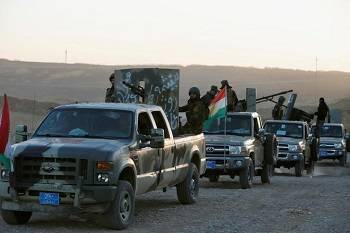More than 10,000 Iraqis have fled their homes since the start of an offensive to retake Mosul from ISIL this month, according to the UN.
That figure is just a fraction of the displacement that aid groups expect to see when Iraqi forces reach the city limits and some of the million-plus people thought to be inside attempt to flee.
"As the fighting gets closer to more populated areas, we're starting to see more and more families flee the fighting," Al Jazeera's Stefanie Dekker, reporting from Erbil in northern Iraq, said.
"At least 1,000 people were evacuated by [Iraqi] counterterrorism forces from their villages," Dekker added. "These are terrifying times for those people - their houses are shaking, and they are being caught in the crossfire."
And while those evacuated by the elite Iraqi unit were guided to nearby camps, there "are no humanitarian corridors" to manage the thousands more being displaced, Dekker said.
"Many other people are making this terrifying journey on foot."
But, though the number of displaced Iraqis has increased rapidly over the past two days, there was no sign an exodus of larger proportions was beginning.
The aid community has been scrambling to build camps and bring equipment to areas on the edges of the Mosul battlefield, a vast area where Iraqi forces are closing in on ISIL from the north, east and south.
Strong resistance from ISIL has made the battle slow and dangerous, but Iraqi and Kurdish Peshmerga forces have retaken 90 villages and Iraqi government troops have gotten within six kilometers of Mosul on the eastern front.
Meanwhile, the Peshmerga have concentrated their attack in the northeast, on the town of Bashiqa.
US-led coalition forces have been supporting them by hitting parts of the town with air strikes.
The US Secretary of Defense, Ash Carter, said on Wednesday that despite the slow progress, there were no plans to add more troops to the battle.
PHOTO CAPTION
Peshmerga forces advance in the east of Mosul to attack Islamic State militants in Mosul, Iraq, October 17, 2016. REUTERS
Al-Jazeera


 Home
Home Discover Islam
Discover Islam Quran Recitations
Quran Recitations Lectures
Lectures
 Fatwa
Fatwa Articles
Articles Fiqh
Fiqh E-Books
E-Books Boys & Girls
Boys & Girls  Articles
Articles










